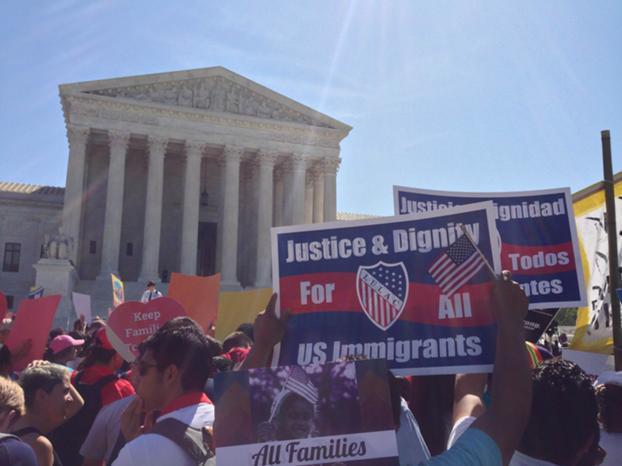DACA and DAPA: Providing Opportunities for the American Dream
Posted on 04/18/2016 @ 07:45 PM

By: Mark Salay, LULAC National Communications Intern
Thousands of immigrant justice advocates rallied in front of the U.S. Supreme Court Monday as the court heard oral arguments in U.S. v. Texas, the most important immigration case in decades.
The lawsuit led by Texas and joined by 25 other states and congressional Republicans, challenges the constitutionality of the Deferred Action for Parents of Americans and Lawful Permanent Residents (DAPA) program and expansion of the Deferred Action for Childhood Arrivals (DACA) program, two key immigration policies enacted by President Obama in 2014.
Implementation of DAPA would protect nearly four million immigrants – those who have been in the country since 2010 and have children of American citizenship or permanent residency – from deportation and grant temporary work permits. An expanded DACA would widen eligibility requirements and increase the number of beneficiaries of the program, which also protects immigrants from deportation and grants access to education and work authorization.
“As a teacher, I feel I can’t teach math and science when I know [student’s] families are broken,” Montserrat Garibay, Vice President for Certified Employees of the labor union Education Austin and member of LULAC Council #4859 in Austin, TX, said. “I think it’s always hard to talk to a four-year-old and tell them their mom is never going to come back. As a teacher, it’s very heartbreaking to have those conversations with kids.”
A few thousand people spilled from the sidewalk onto the street outside the Supreme Court. Supporters of DAPA and DACA chanted the rallying cry, “keep families together,” a reference to parents and children of undocumented status who have been deported, resulting in families being split apart. Unions, grassroots campaigns, and advocacy organizations, including LULAC, were all on hand at the rally.
Ju Hong of the advocacy organization, National Korean American Service & Education Consortium (NAKASEC), recently reunited with his family in South Korea for the first time in 13 years because of DACA, and wants to ultimately see comprehensive immigration reform.
“I’m here to fight, and I’m here to fight beyond DAPA and DACA, beyond the election,” Hong said. “I will continue to fight until immigrant communities no longer face fear of deportation.”
Inside the courtroom, justices allotted a total of an hour and a half to hear arguments, a deviation from the usual hour given in most cases. The plaintiffs argued President Obama’s policies go beyond his executive power and against Congress, while the federal government said the policy does not grant citizenship and lies within the President’s constitutional power.
One of the key points of contention is whether DAPA grants immigrants lawful status. Areli Zarate, a teacher from Austin, Texas and beneficiary of DACA, said that because the policy does not grant permanent residency, her work permit and status in the country can be taken away from her at any time.
“There’s a lot being said in the media about what is DAPA and DACA, and I want people to get educated about it,” said Zarate, also part of Education Austin. “We can never become citizens or residents. That’s not an option. We’re just here as long as the program is available which means at any time, they can kick us out.”
Stakes were high when Thomas Saenz of the legal civil rights organization, the Mexican American Legal Defense and Educational Fund (MALDEF), presented arguments on behalf of three immigrant women eligible for deferred action under DAPA, the only party offering perspective on the human implications of the decision.
Nancy Vega of New Jersey, an undocumented immigrant and mom of three, one with U.S. citizenship and two protected by DACA, said DAPA would allow her to get a better paying job and more income to put her children through college.
“I am not afraid. I am not afraid because I have not done anything wrong. I do not harm anyone, and I think everyone deserves an opportunity” Vega said. “I would tell the people who are against the President’s policies that we are all immigrants. We all come from immigrant mothers and fathers.”
The court is expected to rule on the case in June. If the case results in a 4-4 split, due to the current absence of one justice, a previous appellate court ruling would keep the policies frozen, but would not set court precedent.
Mark Salay is the Communications Intern at the LULAC National Office in Washington, D.C. He is a senior at the University of California, Santa Barbara, majoring in communication with minors in history and professional writing, and will be graduating in the Spring of 2016.

Comments
Leave a Comment
You must be logged in to leave a comment.